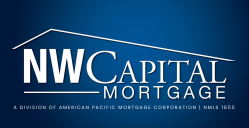
Do you have questions? We can help! You will find the answers to several frequently asked mortgage questions below.
The pre-approval process is much more complete than pre-qualification. For pre-qualification, the loan officer asks you a few questions and provides you with a pre-qual letter. Pre-approval includes all the steps of a full approval, except for the appraisal and title search. Pre-approval can put you in a better negotiating position, much like a cash buyer. NW Capital Mortgage recommends you work with a lender that does a full pre-approval.
Usually, people refinance to save money either by obtaining a lower interest rate or by reducing the term of the loan. Refinancing is also a way to convert an adjustable loan to a fixed loan or to consolidate debts. The decision to refinance can be difficult, since there are several reasons to refinance. However, if you are looking to save money, try this calculation:
Since refinancing is a complex topic, consult a mortgage professional.
A rate lock is a contractual agreement between the lender and buyer. There are four components to a rate lock: loan program, interest rate, points, and the length of the lock.
Many of the programs to buy a home without saving for a down payment are only available through direct lenders. So, if you are wanting to buy a home and you do not have a down payment saved, you probably want to work with a direct mortgage lender. WABondLoans.com recommends working with a Direct Mortgage Lender who can also broker loans when needed. This gets you the best of both worlds. All of our Loan Officers meet this standard.
Both income and assets are disclosed and verified, and income is used in determining the applicant's ability to repay the mortgage. Formal verification requires the borrower's employer to verify employment and the borrower's bank to verify deposits. Alternative documentation, designed to save time, accepts copies of the borrower's original bank statements, W-2s and paycheck stubs. You often get the best rates with this type of loan.
A loan estimate is a document that provides details about a proposed mortgage loan, including the estimated interest rate, monthly payment, and closing costs.
A loan eligible for purchase by the two major Federal agencies that buy mortgages, Fannie Mae and Freddie Mac.
It is an upfront cash payment that may be required by the lender as part of the charge for the loan, expressed as a percent of the loan amount; e.g., "2 points" means a charge equal to 2% of the loan balance. Most loans types do not require points to be paid. But most loans types give you the option to use points to get a lower rate.
This is the process of determining whether a customer has enough cash and sufficient income to meet the qualification requirements set by the lender on a requested loan. A pre-qualification is subject to verification of the information provided by the applicant. A pre-qualification is short of approval because it does not take account of the credit history of the borrower. NW Capital Mortgage recommends you work with a lender that does a full pre-approval.
Yes. Washington and Oregon both offer down payment assistance and first-time buyer programs. In Clark County, Washington, buyers can access Washington State Housing Finance Commission programs. In the Portland metro area (including Multnomah, Washington, and Clackamas counties), Oregon Bond and local grant options may be available. These programs can reduce upfront costs and make homeownership more affordable.
Closing costs usually range from 2% to 5% of the home’s purchase price. In Southwest Washington and the Willamette Valley, these may include appraisal fees, title insurance, loan origination fees, and prepaid property taxes. We’ll provide a detailed estimate so you know exactly what to expect before closing. We can also work with your realtor to see if we can get some or all of your closing costs paid by the home seller.
Your qualifying amount depends on income, credit, debts, and the current interest rate. In Vancouver, Washington, rising home values mean it’s important to get pre-approved to understand your budget. Our team can review your financial situation and provide a personalized loan amount based on today’s market conditions.
It depends on the area. Homes in Washington state often have slightly higher purchase prices near Vancouver, Camas, and Ridgefield, but buyers benefit from having no state income tax. Oregon markets like Salem or Washington County may offer more inventory. Property taxes tend to be much higher in Portland. We’ll help you compare total costs, including property taxes, to see what’s best for you.
Yes. If you work in Portland, Oregon, your wages are subject to Oregon state income tax, even if you live in Vancouver. However, as a Washington resident, you won’t pay state income tax on non-Oregon income. Many buyers still choose Vancouver for affordability, lifestyle, and long-term savings.
Down payment assistance programs are typically available for all these loan types, but they are most often used with FHA or conventional loans. With these programs, conventional and FHA loans can also be effectively zero down payment.
We’ll review your goals to determine which program offers the best fit for your budget and situation.
Clark County property taxes generally range from 1% to 1.25% of assessed value. Washington and Clackamas counties in Oregon average around 1% but can vary by city. Portland in Multnomah County tends to have the highest property taxes. Keep in mind that Washington has no state income tax, while Oregon does. We’ll help you calculate your total housing costs before deciding where to buy.